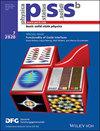Half‐Metallic Ferromagnetism in 2D Janus Monolayers: Mn2GeX (X = As, Sb)
IF 1.8
4区 物理与天体物理
Q3 PHYSICS, CONDENSED MATTER
引用次数: 0
Abstract
Two‐dimensional (2D) Janus materials are a fascinating class of materials resulting from their unique electronic and magnetic properties induced by mirror symmetry breaking. However, 2D Janus materials with intrinsic magnetism remain rather rare, casting a mysterious veil over magnetism. In this work, the electronic and magnetic properties of Janus Mn二维杰纳斯单层中的半金属铁磁性:Mn2GeX(X = As,Sb)
二维(2D)杰纳斯材料是一类迷人的材料,其独特的电子和磁性能是由镜像对称破缺引起的。然而,具有内在磁性的二维杰纳斯材料仍然相当罕见,给磁性蒙上了一层神秘的面纱。在这项研究中,利用第一性原理计算研究了 Janus Mn2GeX(X = As、Sb)单层材料的电子和磁性能。结果表明,这些 Janus 材料表现出卓越的机械和动态稳定性,表明它们未来在纳米级自旋电子器件中的应用潜力。有趣的是,Janus 和单层材料具有令人兴奋的半金属特性,半金属间隙分别为 0.29 和 0.18 eV,自旋间隙分别为 1.68 和 1.62 eV。它们计算出的基态表现出强烈的铁磁有序性,居里温度()分别为 630 K 和 590 K。此外,Janus Mn2GeX(X = As、Sb)单层的铁磁性对-6%到6%的双轴应变具有很强的抵抗力。在 6% 的拉伸应变下,单层的计算值为 639 K,比未应变条件下的计算值增加了 9%。所有这些引人入胜的电子和磁性能使 Janus Mn2GeX(X = As、Sb)单层成为纳米级自旋电子器件的理想候选材料。
本文章由计算机程序翻译,如有差异,请以英文原文为准。
求助全文
约1分钟内获得全文
求助全文
来源期刊
CiteScore
3.30
自引率
6.20%
发文量
321
审稿时长
2 months
期刊介绍:
physica status solidi is devoted to the thorough peer review and the rapid publication of new and important results in all fields of solid state and materials physics, from basic science to applications and devices. Being among the largest and most important international publications, the pss journals publish review articles, letters and original work as well as special issues and conference contributions.
physica status solidi b – basic solid state physics is devoted to topics such as theoretical and experimental investigations of the atomistic and electronic structure of solids in general, phase transitions, electronic and optical properties of low-dimensional, nano-scale, strongly correlated, or disordered systems, superconductivity, magnetism, ferroelectricity etc.

 求助内容:
求助内容: 应助结果提醒方式:
应助结果提醒方式:


